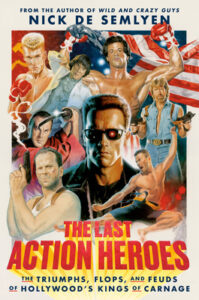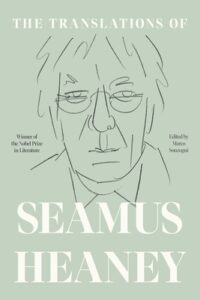
Our smorgasbord of superior reviews this week includes Kristen Arnett on K. Patrick’s Mrs. S, Constance Grady on Lorrie Moore’s I Am Homeless If This Is Not My Home, Max Carter on Nick de Semlyen’s The Last Action Heroes, Tess Taylor on The Translations of Seamus Heaney, and Rumaan Alam on Jenny Erpenbeck’s Kairos.
“In Mrs. S…bodies exist as a site of ongoing construction. Perhaps this is because our protagonist does not know how she feels about the particular body that she inhabits. And the questions that crop up because of that unknowing make for an entirely captivating read … Here is one of the book’s chief themes: what it means for a woman to exist outside the bounds of socially approved femininity … In due course the novel offers a steamy love story, and Patrick proves to be a deft hand at the erotic … There’s a voyeurism present that has to do with the protagonist and her own destabilizing emotions…but the voyeurism has just as much to do with the audience that watches the narrator. How they look at her informs her relationship to her butch body … Patrick’s staccato sentences add a layer of choppy, additional drama to the text. It becomes a secondary language for butchness, powerful and confident; flowery description unnecessary. In this way, questions about sex and love and gender are layered on top of one another. Our protagonist starts out fearful of these queries but eventually revels in the unknowing, fine with wandering at the crossroads of sexuality and gender. I could wax on about the sensuality of Patrick’s narrative, how sometimes loneliness means gazing deeply into the well of your own self, wondering at the stranger who’s reflected back. But I’d rather leave it with the unanswered question. Change comes for us all, and that’s a beautiful, awesome thing. Save the knowledge for later.”
–Kristen Arnett on K. Patrick’s Mrs. S (The New York Times Book Review)
“Resists analysis. This is a novel made out of air, unstructured, unskeletoned. There’s a central storyline, sort of, but summarizing that doesn’t quite get at what the experience of reading this weird, funny, tender, and occasionally gross book is like … Libby’s letters are gripping—Moore can really write a 19th-century pastiche!—but don’t expect the Booth stuff to become a mystery or the key to the plot. There isn’t a plot. This is the kind of book where not all that much happens, but all of it seems to matter … Moore’s short stories frequently deal with death and illness and hospitals. The stories are shaggy, like this novel, but compact; the constraints of the medium grant them shape and form, as though Moore has poured her lovely sentences like water into the vessel of the short story. In I Am Homeless If This Is Not My Home, she seems to have poured her sentences out onto the ground, where they spread and stretch and sink into the soil. This is a strange and beautiful book, and when you try to catch it in your hands, it dissolves.”
–Constance Grady on Lorrie Moore’s I Am Homeless If This Is Not My Home (Vox)

“If, paraphrasing the great Miss Jean Brodie, macho bullshit—one-inch ponytails, punching snakes, half-speed crotch kicks—is to your taste, Nick de Semlyen…lays on an all-you-can-eat feast in The Last Action Heroes…De Semlyen’s action-star pantheon features Schwarzenegger, Sylvester Stallone, Bruce Willis, Chuck Norris, Dolph Lundgren, Jackie Chan, Jean-Claude Van Damme, and Steven Seagal. The eight-hander format might have undone The Last Action Heroes were it not for its deft, hilarious, overlapping weave of anecdotes and detail … nothing tops Van Damme’s attempts to break in (at times, literally). His film-festival pitch entailed ‘scamper[ing] around, approaching anyone who looked important, and shouting, “Look at this!” before performing high kicks and jumps in front of them.’ He once drove to Stallone’s mansion and tried to scale the wall. The police were called. His excuse: ‘I just want to do karate with Stallone’ … The Last Action Heroes mines, in parallel, an exquisite trove of mercifully unrealized ideas. Stallone as Superman. Seagal as Batman. Stallone’s initial finale for Rocky II, involving the Colosseum and the Pope (playing himself). A mob-meets–Staying Alive version of The Godfather Part III starring John Travolta as Michael Corleone’s son, Anthony, with Stallone directing … What’s the moral of The Last Action Heroes? I would venture to say that any book that relates Van Damme’s boast during the filming of Universal Soldier that he ‘could crack a walnut open with his ass cheeks’ perhaps doesn’t need one.”
–Max Carter on Nick de Semlyen’s The Last Action Heroes: The Triumphs, Flops, and Feuds of Hollywood’s Kings of Carnage (AirMail)

“Heaney translated the poetry of others in large part to discover this self-revealing double-take. Among the most important things that we learn in Marco Sonzogni’s newly collected The Translations of Seamus Heaney—an immense and informative gathering of the late Nobel Prize winner’s translations—are the ways that Heaney, as translator, thought less of carrying over the so-called literal, and more of finding the pitch and resonance that help an audience receive a poem … As a translator, Heaney was an omnivore, reading across time and culture, finding poets he carried over to English with a freshness and diversity of tone—voices ancient and contemporary, male and female, Romanian, Spanish, Dutch, Old Irish, Czech, Greek. Sometimes he forged projects for a small eon … Heaney’s translations would thus triangulate and echo his contemporary elegies back through their mythic proportions. Which is to say, all along, translation was a parallel career, a parallel track, that marched alongside Heaney’s long practice of writing poetry. In my mind, I imagine them as two horses, pulling the same huge cart of Heaney’s literary imagination … Between digging potatoes and digging the dead, Heaney resurfaced material from various literary underworlds, helping make them known in his voice and dialect and time … Heaney dresses old songs in new clothes. He frees them to pass through us, too. ‘An original work exists not in order to be perfect but in order to engender itself repeatedly in new translations,’ he is quoted as saying. Of course, for any new translation to be heard, to keep engendering, it paradoxically requires a perfect disguise of its own. Over and over again, to many varied verses, Heaney, with a touch both sure and shape-shifting, offers exactly that.”
–Tess Taylor on The Translations of Seamus Heaney (The New York Times Book Review)
“We might assume a contemporary novel will upend the convention: give voice to the younger woman, or reveal romance as exploitation—abuse, even. Erpenbeck is up to something less predictable … This is a book about a decisive moment in these small lives, but it’s also a novel about a moment in history … We assume age difference means power discrepancy, but in fact Hans and Katharina are well-matched. What is to come for these two bolsters Hans’s assertion that love and hate are closely related … Kairos does not condemn Hans for this violence; it does not posit Katharina’s submission to her lover as abuse. It’s a clear-eyed book, morally neutral and the more interesting for it … Katharina and Hans’s long dialogue becomes two people speaking to time itself. It’s at once a novel about the collision between two people and one about the collision of two German lives: a onetime Hitler Youth and a girl born into a divided city … My inability to comprehend how it might have felt to be an East German in 1989—exchanging one’s entire life for something called freedom—felt first like a personal intellectual failing. Then it felt like the author’s very point. Perhaps I can no more imagine being a 53-year-old man besotted with a 19-year-old girl. Maybe history is as fundamentally unknowable as what goes on between two other people: ecstasy and passion, insult and pain, the singular complicated thing we sum up as love. After all, am I not as poorly equipped as Katharina the Young Pioneer was, taught that this decisive moment in history was ‘our’ long-awaited triumph in the Cold War? … I don’t know what a national process of political reconciliation might look like, in Germany or in the United States, where there’s plenty of atonement to be done. Erpenbeck, however, might already be working in pursuit of that. ‘Is it the case here,’ the author wonders, ‘that day after day, silently, people come to an understanding of their own lives by way of the understandings of others?’ To me, that sounds like the project of fiction itself.”
–Rumaan Alam on Jenny Erpenbeck’s Kairos (The New Republic)

